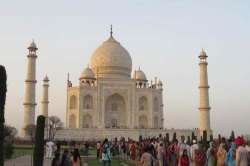'Perhaps, you don't care': Supreme Court slams Centre over changing colour of Taj Mahal
The apex court suggested that the Centre take the assistance of experts from India and abroad to first assess the damage and then take steps to restore the historic monument.

The Supreme Court today expressed concern over the change of colour of the iconic Taj Mahal at Agra and said the monument had become yellowish earlier and was now turning brownish and greenish.
The apex court suggested that the Centre take the assistance of experts from India and abroad to first assess the damage and then take steps to restore the historic monument.
"We don't know whether you have or perhaps don't have the expertise. Even if you have the expertise, you are not utilising it. Or perhaps you don't care," a bench comprising Justices M B Lokur and Deepak Gupta said.
"Perhaps we need some expert organisation from outside India unless there is a decision that the Taj has to go," the bench said sarcastically, adding, "you can get experts from India as well as from outside."
The apex court perused the photographs placed before it by petitioner M C Mehta and asked Additional Solicitor General A N S Nadkarni, who was representing the government, as to why the colour of Taj Mahal has changed.
"First it was yellow and now it is becoming brown and green," the bench observed.
Nadkarni told the bench that the management of Taj Mahal has to be done by the Archaeological Survey of India.
The apex court fixed the matter for further hearing on May 9. Environmentalist Mehta has filed the plea seeking protection of the Taj from the ill-effects of polluting gases and deforestation in and around the area.
The top court has been monitoring developments in the area to protect the historic monument, built by Mughal emperor Shah Jahan in the memory of his wife Mumtaz Mahal in 1631. The mausoleum is a UNESCO World Heritage Site.